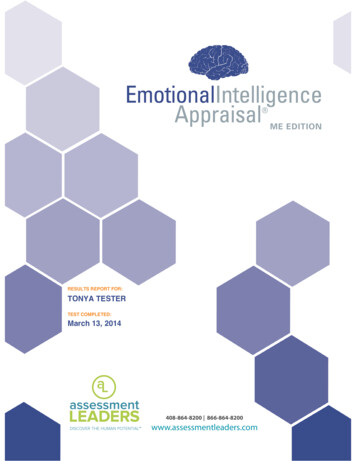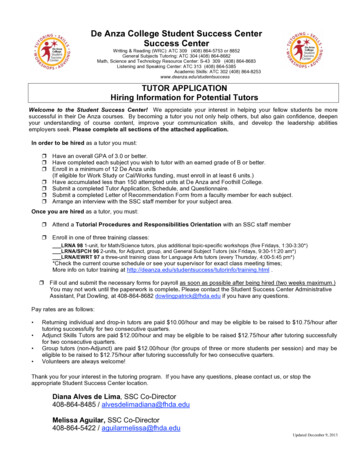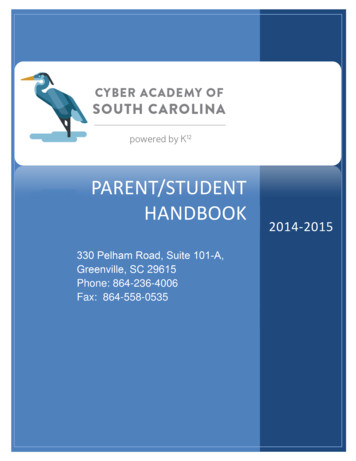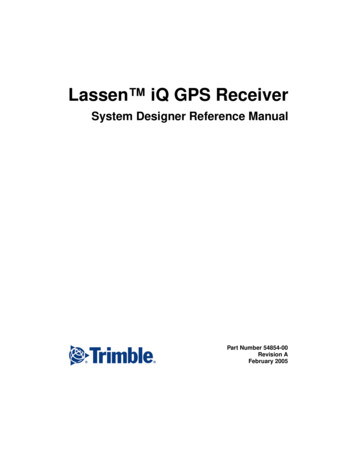
Transcription
RESULTS REPORT FOR:TONYA TESTERTEST COMPLETED:March 13, 2014408-864-8200 866-864-8200www.assessmentleaders.com
ContentsMy EQ Scores1What The Scores Mean2Now For The Numbers3My EQ Strategies4My EQ Lessons8Self-Awareness Lesson9Self-Management Lesson14Social Awareness Lesson18Relationship Management Lesson22i
EMOTIONAL INTELLIGENCE APPRAISAL My EQ ScoresMY EQ SCORESThank you for completing the Emotional Intelligence Appraisal . You are now in a customized learning programthat is based upon your emotional intelligence scores. This program will teach you about emotional intelligence(EQ), reveal what your current skill levels are, and tell you what you can do to improve.This section will:Provide you with your overall EQ score and your scores for each of the four EQ skills. You have unlimited accessto your online report. You can access this report with the following log-in information:URL address: HAT DOES EMOTIONAL INTELLIGENCE LOOK LIKE?The four parts of the emotional intelligence model are based upon a connection between what you see and whatyou do with yourself and others.1
EMOTIONAL INTELLIGENCE APPRAISAL What The Scores MeanWHAT THE SCORES MEANScores on the Emotional Intelligence Appraisal come from a "normed" sample. That means your scores arebased on a comparison to the global population to discover where you fall in each skill area. Read the followingdescriptions to better understand what your scores mean about your current skill level.ScoreMeaningA STRENGTH TO CAPITALIZE ON90-100These scores are much higher than average and indicate a noteworthy strength.These strengths probably come naturally to you or exist because you have workedhard to develop them. Seize every opportunity to use these emotionally intelligentbehaviors to maximize your success. You are highly competent in this skill, so workto capitalize on it and achieve your potential.A STRENGTH TO BUILD ON80-89This score is above average. However, there are a few situations where you don'tdemonstrate emotionally intelligent behavior. There are many things you've donewell to receive this score and a few that could be better with some practice. Studythe behaviors for which you received this score and consider how you can polishyour skills.WITH A LITTLE IMPROVEMENT, THIS COULD BE A STRENGTH70-79You are aware of some of the behaviors for which you received this score, and youare doing well with them. Other emotionally intelligent behaviors in this group areholding you back. Lots of people start here and see a big improvement in theiremotional intelligence once it's brought to their attention. Use this opportunity todiscover the difference and improve in the areas where you don't do as well.SOMETHING YOU SHOULD WORK ON60-69This is an area where you sometimes demonstrate emotionally intelligent behaviorbut not usually. You may be starting to let people down. Perhaps this is a skill areathat doesn't always come naturally for you or that you don't make use of. With alittle improvement in this skill, your credibility will go way up.A CONCERN YOU MUST ADDRESS59 and BelowThis skill area is either a problem for you, you don't value it, or you didn't know itwas important. The bad news is your skills in this area are limiting youreffectiveness. The good news is this discovery and choosing to do somethingabout it will go a long way in improving your emotionally intelligent behavior.2
EMOTIONAL INTELLIGENCE APPRAISAL Now For The NumbersNOW FOR THE NUMBERS.Your Overall Emotional Intelligence Score: 76Personal Competence: 75The collective power of your self-awareness and self-management skills. It's how you use emotionalintelligence in situations that are more about you privately.Self-Awareness78Your ability to accurately perceive your emotions and stay aware of them as they happen. This includeskeeping on top of how you tend to respond to specific situations and certain people.Self-Management71Your ability to use awareness of your emotions to stay flexible and positively direct your behavior. This meansmanaging your emotional reactions to all situations and people.Social Competence: 78The combination of your social awareness and relationship management skills. It's more about how you arewith other people.Social Awareness77Your ability to accurately pick up on emotions in other people and get what is really going on. This often meansunderstanding what other people are thinking and feeling, even if you don't feel the same way.Relationship Management79Your ability to use awareness of your emotions and the emotions of others to manage interactionssuccessfully. Letting emotional awareness guide clear communication and effective handling of conflict.3
EMOTIONAL INTELLIGENCE APPRAISAL My EQ StrategiesMY EQ STRATEGIESThis section analyzes your score profile to suggest the three EQ strategies that will increase your EQ the most.Start your EQ skill development with: SELF-MANAGEMENTComplete descriptions of your recommended self-management strategies (listed in the table below) can be foundon the pages that follow.What brings your score down most:What you can do to improve:Resisting change.Accept That Change is Just around the Corner:Self-management strategy #17Take Control of Your Self-Talk:Self-management strategy #9Count to Ten:Self-management strategy #4Brushing people off when something is botheringyou.Not holding back when you know your actionsand/or words will not help the situation.4
EMOTIONAL INTELLIGENCE APPRAISAL My EQ StrategiesSELF-MANAGEMENT STRATEGY #1Accept That Change is Just around the CornerNone of us is born with a crystal ball that predicts the future. Since you can't foresee every change and everyobstacle that life throws in your path, the key to navigating change successfully is your perspective beforechanges even surface.The idea here is to prepare for change. This is not so much a guessing game where you test youraccuracy in anticipating what's next, but rather thinking through the consequences of potential changes so thatyou aren't caught off guard if they surface. The first step is to admit to yourself that even the most stable, trustedfacets of your life are not completely under your control. People change, businesses go through ebbs and flows,and things just don't stay the same for long. When you allow yourself to anticipate change—and understand youroptions if changes occur—you prevent yourself from getting bogged down by strong emotions like shock,surprise, fear and disappointment when changes actually happen. While you're still likely to experience thesenegative emotions, your acceptance that change is an inevitable part of life enables you to focus and thinkrationally, which is critical to making the most out of an unlikely, unwanted or otherwise unforeseen situation.The best way to implement this strategy fully is to set aside a small amount of time either every week orevery other week to create a list of important changes that you think could possibly happen. These are thechanges you'll want to be prepared for. Leave enough room below each change on your list to write out all thepossible actions you will take should the change occur. And below that, jot down ideas for things that you can donow to prepare for that change. What are the signs that you can keep an eye out for that would suggest thechange is imminent? Should you see these signs, is there anything you can do to prepare and soften the blow?Even if the changes on your list never come to fruition, just anticipating change and knowing what you'd do inresponse to it makes you a more flexible and adaptive person overall.* This is self-management strategy #17 from pages 133-134 of the Emotional Intelligence 2.0 book.5
EMOTIONAL INTELLIGENCE APPRAISAL My EQ StrategiesSELF-MANAGEMENT STRATEGY #2Take Control of Your Self-TalkResearch suggests the average person has about 50,000 thoughts every day. Sound like a lot? It doesn't stopthere. Every time one of those 50,000 thoughts takes place, chemicals are produced in your brain that cantrigger reactions felt throughout your body. There is a strong relationship between what you think and how youfeel, both physically and emotionally. Because you are always thinking (much like breathing), you tend to forgetthat you are doing it. You likely don't even realize how much your thoughts dictate how you feel every hour ofevery single day.It's impossible to try and track every single thought you have to see if it's having a positive or negativeinfluence on your emotional state. The thoughts that are most influential are those where you literally talk toyourself. Though you might not realize you have these thoughts, we all have an internal voice inside our headthat affects our perception of things. We tell ourselves to keep quiet, we congratulate ourselves on a job welldone and we reprimand ourselves for making poor decisions. Our thoughts are "talking" to us every day, and thisinner voice is called "self-talk."With thoughts, the primary vehicle for regulating your emotional flow, what you allow yourself to think canrumble emotions to the surface, stuff them down underground, and intensify and prolong any emotionalexperience. When a rush of emotion comes over you, your thoughts turn the heat up or down. By learning tocontrol your self-talk, you can keep yourself focused on the right things and manage your emotions moreeffectively.Much of the time, your self-talk is positive and it helps you through your day ("I'd better get ready for themeeting" or "I'm really looking forward to going out to dinner tonight"). Your self-talk damages your ability toself-manage anytime it becomes negative. Negative self-talk is unrealistic and self-defeating. It can send youinto a downward emotional spiral that makes it difficult to get what you want from life.What follow are the most common types of negative self-talk with the keys to taking control of them andturning them around:1. Turn I always or I never into just this time or sometimes. Your actions are unique to the situationin front of you, no matter how often you think you mess up. Make certain your thoughts follow suit. When youstart treating each situation as its own animal and stop beating yourself up over every mistake, you'll stopmaking your problems bigger than they really are.2. Replace judgmental statements like I'm an idiot with factual ones like I made a mistake.Thoughts that attach a permanent label to you leave no room for improvement. Factual statements are objective,situational, and help you to focus on what you can change.3. Accept responsibility for your actions and no one else's. The blame game and negative self-talkgo hand in hand. If you are someone who often thinks either it's all my fault or it's all their fault you are wrongmost the time. It is commendable to accept responsibility for your actions, but not when you carry someoneelse's burden. Likewise, if you're always blaming others, it's time to take responsibility for your part.* This is self-management strategy #9 from pages 117-119 of the Emotional Intelligence 2.0 book.6
EMOTIONAL INTELLIGENCE APPRAISAL My EQ StrategiesSELF-MANAGEMENT STRATEGY #3Count to TenYou can thank your kindergarten teacher for this one! It was way back then sitting on the classroom rug withyour legs crossed that you learned one of the most effective strategies for turning the temperature down whenyour emotions are running hot. Adulthood has a funny way of making us lose sight of some simple, yet profound,strategies for self-control.All you have to do is this: When you feel yourself getting frustrated or angry, stop yourself by taking in adeep breath and saying the number one to yourself as you exhale. Keep breathing and counting until you reachthe number ten. The counting and breathing will relax you and stop you from taking rash action long enough toregain your composure and develop a more clear, rational perspective of the situation.Sometimes, you might not even reach ten. For example, if you are in a meeting and someone abruptlyinterrupts you to blurt out something ridiculous that rubs you raw, you are unlikely to sit there silently while youbreathe your way to ten. Even if you don't make it to double digits you'll stop the flow of frustration and angerlong enough to cool down your overheated limbic system and give your rational brain some valuable time tocatch up.When your counting needs to be more subtle, there are lots of great ways to hide it from others. Somepeople will actually bring a beverage with them to every meeting they attend. This way, whenever they feel asthough they may blurt out some emotionally charged statement, they take a drink. No one expects them to talkwhen they are drinking. So they have the time they need to calm down (and count if necessary), organize theirthoughts, and plan something to say that's more constructive.Reacting quickly and without much thought fans the flames burning in the emotional brain. Since a snappycomeback usually leads to a heated exchange where barbs are thrown back and forth, it's easy to find yourself inthe midst of a full-blown emotional hijacking. When you slow things down and focus on counting, it engages yourrational brain. You can then regain control of yourself and keep your emotions from running the show.* This is self-management strategy #4 from pages 108-110 of the Emotional Intelligence 2.0 book.7
EMOTIONAL INTELLIGENCE APPRAISAL My EQ LessonsMY EQ LESSONSThis section contains sixteen EQ Lessons that will help you actively increase your understanding of, and capacityfor, each EQ skill. Emotional intelligence is very different from traditional intelligence (IQ). With IQ, it is understoodthat you are generally as smart now as you are ever going to be. People learn new facts but their intelligence, ortheir ability to learn, remains largely the same. Emotional intelligence is a flexible skill that can be readily learned.People increase their emotional intelligence by working on the skills outlined in this learning system.Research shows that people improve their EQ most when the following conditions are present: They have a strong motivation to learn or change They practice new behaviors consistently They seek feedback on their own behaviorHow To Master a New SkillAnytime you are acquiring a new skill, remember the bestpath for doing something new or different looks like this: Find someone who is good at it.Watch that person do it.Get that person to talk about how they do it.Practice doing it yourself with his or her guidance.Ask the person to give you feedback.Practice doing it on your own.Seek feedback until you've mastered it.Change can be a little.Embarrassing, because as you practice new things, the very people who feel you ought to change may poke funat you, forget to encourage you along the way, or not even notice. Don't give up. The rewards will outweigh thesechallenges because you will be better positioned personally and professionally than you ever were before.How to handle it when you feel embarrassed: Say, "I could really use a little support here." Tell people you are serious about getting better at this. Most likely, they will become your allies. Ask for help and suggestions.Change can also be a little.Frustrating, because old habits and behaviors (what you say and do) can be difficult to change.How to handle it when you feel frustrated: Remind yourself that change takes time and practice. Remind yourself that it's OK not to know. Find someone who handles change well. Ask how it's done. Find someone who can encourage you.Change can also be terrific. It surprises most people how a little bit of change in the right direction can goa long way in the eyes of others. Good luck and have fun with it!8
EMOTIONAL INTELLIGENCE APPRAISAL Self-Awareness LessonsSELF-AWARENESS LESSON 1: FEEDBACKTo increase your self-awareness, you need to discover things you tend to do, say, think, and feel that you havepreviously failed to notice or understand. This process can be uncomfortable because some of the things you'lldiscover are unflattering or things you'll want to improve. That said, it's much less painful to seek out thisinformation on your own than wait until someone brings it to your attention.In the following clip from Role Models, Dan (played by Paul Rudd) increases his self-awareness the hard way.Log in to your assessment to watch the clipHow does Dan increase his self-awareness the hard way?She's had enough.Dan gets defensive.Dan realizes he's wrong.She's had enough.Being in a relationship with Dan means Beth is frequently subjected to his bad moods. She finally realizes thathe's so annoyed with everyone because he's unhappy with himself. Beth knows Dan won't change until heunderstands this. So, she breaks it down for him.Dan gets defensive.Like most people in his position, Dan is quick to point out justifications for his behavior. Dan genuinely believeshe's so annoyed because people are so annoying. Beth's feedback doesn't even begin to hit home until herealizes that venti means "twenty."Dan realizes he's wrong.By the time Dan gets to work and discusses the morning's events with a friend, it's clear that Beth's feedback hashad a chance to sink in. Not only does Dan think Beth is right, but Dan's coworker also agrees with her. The moreDan thinks about Beth's feedback, the more he begins to see what is making him so frustrated.SELF-AWARENESS TIPTo increase your self-awareness, you need to embrace feedback with open arms. Research shows that the vastmajority of people struggle to see themselves as others see them, and the most accurate picture of anyone'sbehavior comes from those around them. The best way to find out what others see is to ask them. Asking forfeedback is easy—hearing it without getting defensive is not.Seeking feedback is difficult for most people. It can be scary when you are afraid to finally find out what peoplereally think of you. Nonetheless, feedback from others won't do you any good if you're not open and receptive toother people's perspectives, especially when they differ from your own.Here's a process you can follow to seek feedback that will increase your self-awareness: Seek out a trusted friend or colleague and ask this person if he or she would be willing to share hisor her thoughts about you with you. A "real" feedback discussion is bound to have some difficultmoments, so you need to find someone with whom you can work through these momentscomfortably. Explain to your selected person that you are working on increasing your self-awareness as a resultof reading the Emotional Intelligence Appraisal. Tell him or her what emotional intelligence is anddescribe some of your goals for improving your emotional intelligence (EQ).9
EMOTIONAL INTELLIGENCE APPRAISAL Self-Awareness LessonsSELF-AWARENESS LESSON 1: CONTINUED Ask this person to share with you what he or she sees and thinks regarding your ability tounderstand and respond effectively to your emotions. Be sure to get information on things thataren't readily apparent to you. The following questions should help this conversation: Are there specific situations where, or people with whom, I tend to let my emotions get the best ofme? Is there anything I do too much? That is, can I tone down a certain behavior? What holds me back from managing my emotions effectively?10
EMOTIONAL INTELLIGENCE APPRAISAL Self-Awareness LessonsSELF-AWARENESS LESSON 2: EMOTIONAL MISTAKESIncreasing your self-awareness is not going to be a perfect process. There will be times when your emotions slipbeneath your awareness and get the better of you. These emotional "mistakes" are opportunities to gain a betterunderstanding of your tendencies so that you can change for the better.In Envy, Tim (Ben Stiller's character) and Nick (Jack Black's character) are best friends, neighbors, andco-workers at 3M. Nick recently struck it rich when he invented Vapoorize, a spray that makes dog poopevaporate. Tim's envy grows with Nick's wealth until it eats him up inside. Watch Tim come clean with Nick.Log in to your assessment to watch the clipHow does Tim demonstrate self-awareness?I Should Have Just Told You.It Was Chewing Me Up.You Just Gave To Us, Nick.I Should Have Just Told You.Tim comes to the realization that his feeling of envy toward Nick is not good for their friendship. Fortunately, Timbecomes aware of this and decides to tell his friend. By telling his friend the truth, Nick is using his emotionalmistake as an opportunity to improve both himself and their friendship.It Was Chewing Me Up.Negative emotions that go unchecked are bound to affect your well being negatively. Tim feels guilty once herealizes that he is "wrapped up in the envy for everything" that Nick has. The surprising thing aboutself-awareness is that just spotting your mistakes will help you change, as you can't expect to improve until youunderstand what you're doing "wrong."You Just Gave To Us, Nick.As Tim explains himself, he's careful to avoid blaming Nick for his own behavior. Tim could have easily pointedthe finger at Nick for throwing his wealth around and rubbing his success in Tim's face. Self-awareness requirestaking full responsibility for your contribution to a given situation. You can't change anyone's behavior but yourown. Thus, your effectiveness hinges upon your ability to embrace your mistakes and learn from them.11
EMOTIONAL INTELLIGENCE APPRAISAL Self-Awareness LessonsSELF-AWARENESS LESSON 3: A LIFE-LONG JOURNEYHow well you know and understand yourself at age 25 is very different from what you come to know by age 50. InLost in Translation, a conversation between two insomniac travelers illustrates the difference. The clip opens withCharlotte (played by Scarlett Johannson) wondering if life gets any easier. See what she learns from Bob (playedby Bill Murray).Log in to your assessment to watch the clipWhat do Charlotte and Bob learn from each other?Does It Get Any Easier?Anyone Can Be A Mentor.What's really important?Does It Get Any Easier?In Bob's answer to Charlotte's first question, he zeros in on the true value of raising your self-awareness. He says,"The more you know who you are and what you want, the less you let things upset you." Charlotte doesn't seemto know yet who she is or what she wants, but she's open to learning more about herself, which is the key toself-awareness.Anyone Can Be A Mentor.Though Bob isn't Charlotte's official mentor, he demonstrates effective mentoring strategies. He gives honestanswers to her questions, listens more than he speaks, and offers reassuring statements ("You'll figure that out.","I'm not worried about you."). He knows Charlotte's lack of self-awareness is typical for her age, and he urges herto trust her gut. Even when she claims, "But, I'm so mean." Bob's reply of "Mean is OK," suggests that she shouldput her worries into perspective and keep on learning and growing.What's really important?Charlotte may be on the receiving end of a conversation about life, but Bob is also learning. Revisiting his own lifepath improves his perspective. Talking aloud about the scary and delightful aspects of parenting reminds him ofwhat's truly important in his life. Revisiting your values now and again can help you to increase yourself-awareness and improve your focus on what's truly important to you, regardless of where you are in life.12
EMOTIONAL INTELLIGENCE APPRAISAL Self-Awareness LessonsSELF-AWARENESS LESSON 4: LISTEN TO WHAT OTHERS SAYNo matter how hard you try to increase your self-awareness, there are always going to be some things that youcannot see without help from others. Your self-awareness hinges upon how open you are to feedback.Feedback from other people can come unexpectedly, making it difficult to accept. In this scene from Along CamePolly, Ben Stiller's character, Reuben Feffer, gets some unexpected feedback from Polly (played by JenniferAniston). Watch and see if Polly's feedback increases Reuben's self-awareness.Log in to your assessment to watch the clipWhat is the impact of Polly's feedback?Why Do You Do It?Awareness Equals Freedom.Why Do You Do It?When Polly questions Reuben's nightly routine, it is clear he has never given it much thought. At first, Reubengets defensive, acting as if putting the pillows out each day is no big deal. As Polly persists, he begins thinkingabout the motivation for this behavior.Awareness Equals Freedom.Polly's feedback helps Reuben realize that he's still trying to please his ex-wife with the pillows. This realizationfrees him, and he lets out all of his pent up frustration on the pillows he no longer needs. Reuben's openness toPolly's feedback increases his self-awareness and releases him from a daily behavior that is holding him back.The result is a profoundly cathartic moment for Reuben.13
EMOTIONAL INTELLIGENCE APPRAISAL Self-Management LessonsSELF-MANAGEMENT LESSON 1: PUSHING YOUR BUTTONSIt's easy to think that good self-management is as simple as controlling explosive emotional outbursts. Althoughyou do need to control outbursts, your emotions have a negative impact on your behavior in other, less obviousways.In the following clip from Erin Brockovich, both characters demonstrate poor self-management. As you watch theclip, see if you can pick up on the self-management mistakes each character makes.Log in to your assessment to watch the clipWho does what?She starts things off right.He pushes her buttons.She loses her cool.She starts things off right.When you have an uncomfortable interaction with another person, the range and intensity of your emotions arebound to change as the situation unfolds. Erin starts the meeting off right by remaining calm and listening to whatEd has to say.He pushes her buttons.Becoming a better self-manager requires taking an honest look at all the ways your emotions create problems foryou. In Ed's case, having fun with Erin at her expense was a poor choice. Not only does Ed end up looking bad,but he also ruins what would have otherwise been a great moment for them to share.She loses her cool.When people push your buttons, powerful emotions rush to the surface. Effective self-managers keep tabs ontheir emotions throughout a difficult conversation, so that they know when their buttons are being pushed and canrespond accordingly. In Erin's case, she could have avoided falling into Ed's trap by asking to see the checkbefore taking the discussion any further.SELF-MANAGEMENT TIPAn uncontrolled emotional outburst—even though it may make you feel better temporarily—can do major harm toyour relationships. When your relationships are not voluntary, such as with your colleagues at work, minimizingthis type of damage is essential to the health and productivity of your relationship.14
EMOTIONAL INTELLIGENCE APPRAISAL Self-Management LessonsSELF-MANAGEMENT LESSON 2: DEALING WITH BELLIGERENT PEOPLEPeople often assume that self-management equals biting your tongue when people push your buttons, even tothe point of being a pushover. Truth is, you can manage yourself effectively without letting people walk all overyou.So is the case with Coach Gary Gaines (played by Billy Bob Thornton) in this clip from Friday Night Lights. Coachhas his work cut out for him in taking on leading a team in a football-crazy town that's bent on perfection. In thisscene, he runs into two athletic boosters that threaten his job if the team doesn't win the state championship.Watch how Coach keeps his emotions under control without being a pushover.Log in to your assessment to watch the clipHow does Coach deal with the boosters?He's Direct.He Listens To What TheyHave to Say.He's Direct.Coach can tell the men are up to something when they crack jokes about winning. Coach takes his job seriously.So, instead of letting them continue to disrespect him by joking about winning, he asks them directly andrespectfully, "Is everything alright?" Coach's question throws the boosters off at first. Once they get over theirsurprise, they speak directly to him about winning.He Listens To What They Have to Say.It's clear that Coach is irritated when he asks the boosters, "Or, what?" However, he's still managing himselfeffectively by forcing them to be direct and not lashing out at them. It's ridiculous that the boosters are tellingCoach his job is at stake if he doesn't win the state championship, but he resists the urge to get back at them.Coach could have easily gotten defensive, angry, or made a promise that he couldn't keep to placate the men.Instead he holds his ground and tells them, albeit with a hint of sarcasm, that he appreciates their support.15
EMOTIONAL INTELLIGENCE APPRAISAL Self-Management LessonsSELF-MANAGEMENT LESSON 3: KEEPING YOUR COOL IN A DIFFICULT CONVERSATIONWe don't experience emotions in a vacuum; if we did, managing them would be easy. The place where mostpeople trip up and fail to self-manage is during difficult conversations. Whether a heated debate with a colleagueor a tense interchange with your significant other, situations that elicit high-intensity feelings put your trueself-management skills to the test.The following clip from Catch Me If You Can will show you how others practice self-management—even with badintent—during a difficult conversation. In the clip, Carl Hanratty (played by Tom Hanks) is an FBI agent on themove to track down Frank Abagnale (played by Leonardo DiCaprio), who is a skillful check forger. Carl catches upto Frank in a hotel room. Since he doesn't know what Frank looks like, Frank tricks Carl into thinking that he is aSecret Service agent. Watch how nervous Frank is when confronted by Carl, and notice how Frank is able toremain calm in spite of this, enabling him to maintain the ruse.Log in to your assessment to watch the clipHow does Frank keep his cool?Relax! You're Late!A Sip of Water.Relax! You're Late!In an inte
EMOTIONAL INTELLIGENCE APPRAISAL What The Scores Mean WHAT THE SCORES MEAN Scores on the Emotional Intelligence Appraisal come from a "normed" sample. That means your scores are based on a comparison to the global population to discover where you fall in each skill area. Read the following










